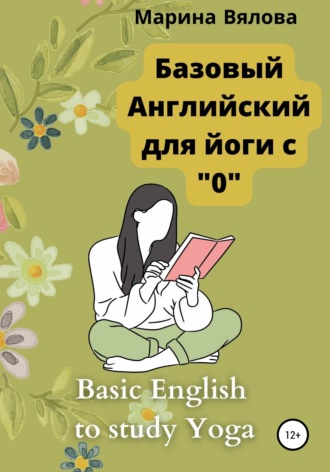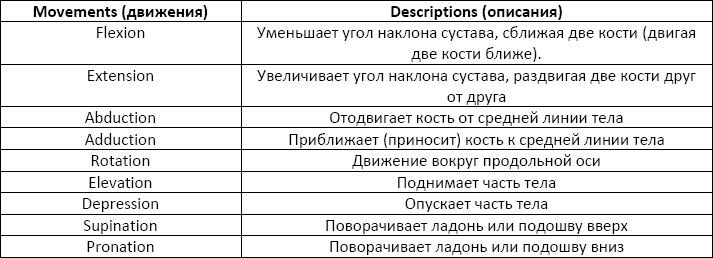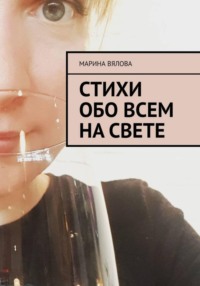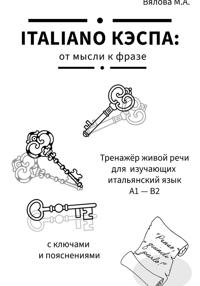 полная версия
полная версияБазовый английский для йоги с "0"
7. I began my yoga class very early yesterday. I didn’t begin my yoga class very early yesterday. Did I begin my class very early yesterday? – Я начал своё занятие по йоге очень рано вчера.
Задание 13. Упражнение 11. She was Maria. She was not Maria.
2. You were Peter and Dave. You were not Peter and Dave.
3. They were Alexander and Dave. They were not Alexander and Dave.
4. He was Ted. He was not Ted.
5. You were Mike. You were not Mike.
6. I was Fred and I was hungry. I was not Fred and I was not hungry.
7. We were Jim and Jake. We were not Jim and Jake.
8. Peter was yogi. Peter was not yogi.
9. Maria was strong. Maria was not strong.
10. Peter and Maria were flexible and strong. Peter and Maria were not flexible and strong.
11. My arms were cold. My arms were not cold.
Задание 13. Упражнение 28. Кто она была? – Who was she?
9. Кто они были? – Who were they?
10. Где ты был вчера? – Where were you yesterday?
11. Почему ты был здесь? – Why were you here?
12. Что это было? – What was it?
13. Где это было? – Where was it?
14. Где мы были вчера? – Where were we yesterday?
Задание 14. Упражнение 11. We were staying here last night. (to stay – оставаться, находиться где-то; here – здесь) – We were not staying… – Мы были здесь прошлой ночью (находились).
2. Maria and Peter were staying home all day long. – Maria and Peter were not staying home all day long. – Пётр и Мария были (оставались) дома весь день.
3. They were doing different (различный) asanas during the lesson. – They were not doing different asanas during the lesson. – Они выполняли различные асаны на протяжении урока.
4. She was running all day. – She was not running all day. – Она бегала целый день.
5. I was stretching my back for 20 minutes. – I was not stretching my back for 20 min. – Я растягивал спину 20 минут.
6. You were reading the book. (to read – читать) – You were not reading the book. – Ты читал книгу.
7. I was jumping all night. – I was not jumping all night. – Я прыгал всю ночь.
8. You were meditating for 3 hours. (to meditate – медитировать) – You were not meditating for 3 hours. – Ты медитировал 3 часа.
Задание 14. Упражнение 21. Что ты делал вчера дома всю ночь? – What were you doing home all night yesterday?
2. Ты занимался вчера йогой 2 часа? – Were you doing yoga for 2 hours yesterday?
3. Почему ты занимался вчера йогой 2 часа? – Why were you doing yoga for 2 hours yesterday?
4. Когда ты сидел на коврике? – When were you sitting on the mat?
5. Как долго она вчера бегала? – How long (for how long) was she running?
6. Где ты вчера медитировал? – Where were you meditating yesterday?
7. Пётр прыгал? – Was Peter jumping?
Задание 14. Упражнение 31. I was doing yoga all day yesterday. I was not doing yoga all day yesterday. Was I doing yoga all day yesterday? What was I doing all day yesterday?
2. She was running all evening. She was not running all evening. Was she running all evening? What was she doing all evening?
3. They were sleeping well. They were not sleeping well. Were they sleeping well? Why were they sleeping well?
4. We were staying home all day. We were not staying home all day. Were we staying home all day? For how long were we staying home?
5. Maria and Peter were stretching their legs, not arms. Were Maria and Peter stretching their legs? What were Maria and Peter stretching?
6. He was doing good. He was not doing good. How was he doing? Was he doing good?
7. My friend was hiding all day long. My friend was not hiding all day long. Who was hiding all day long?
Задание 14. Упражнение 41. I did it! I was doing it for 2 hours! – Я сделал это! Я дела это 2 часа! – Did you do it? Were you doing it for 2 hours? или How long were you doing it?
2. I walked 3 km. I was walking for 2 hours. – Я прошёл 3 километра. Я шёл 2 часа. – Did you walk 3 km? Were you walking for 2 hours? или How long were you walking?
3. I was sitting on the mat when the teacher came (come-came-come – приходить) – Я сидел на коврике, когда вошёл учитель. – Were you sitting on the mat when the teacher came?
4. I told her “no”. I was telling her “yes” for 1 year (year – год) – Я сказал ей «нет». Я говорил ей «да» на протяжении года. – Did you tell her «no»? Were you telling her yes for 1 year?
5. I did my yoga. I was doing my yoga for 1 hour. – Я позанимался йогой. Я занимался йогой 1 час. – Did you do your yoga? Were you doing yoga for 1 hour? или For how long (how long) were you doing yoga?
6. We were reading this book all evening. You read it 1 hour ago. – Мы читали эту книгу весь вечер. Ты прочёл её 1 час назад. – Were you reading this book all evening? или How long were you reading this book? Did you read it 1 hour ago? When did you read it?
7. They were getting tired. I got tired. – Они уставали. Я устал. – Where you getting tired? Did you get tired?
Текст.
How the King Ravana Got Ten Heads – past simple глагола get, получать.
To please Lord Brahma, Ravana underwent (past simple) severe penance (tapasya) that lasted (past simple – глагол to last (длиться) не употребляется в continuous) for several years. One day to appease Lord Brahma, he decided (past simple) to chop off his head. When he chopped off (past simple) his head, it grew back (past simple) again. He was chopping off (past continuous) his head till his austerity pleased Lord Brahma. Impressed by Ravana’s dedication, Lord Brahma blessed him with ten heads and Ravana became one of the greatest and the most powerful king. The ten heads of Ravana are symbolic of the six Shastras and four Vedas that he mastered.
Задание 15. Упражнение 11. We have done it already. – Мы уже сделали это.
2. She has had a good day. – Она хорошо провела день (имела хороший день).
3. They have been busy till now. – До настоящего момента (до сейчас) они были заняты.
4. You have been worried. It is all ok. – Ты поволновался. Сейчас всё ок.
5. He is not hungry. He has just had lunch. – Он не голоден. Он только что обедал.
6. We have eaten already. – Мы уже поели.
7. They have just started. – Они только что начали.
8. You have just run 2 km. – Ты только что пробежал 2 км.
9. It has already passed. – Это уже прошло.
10. The lesson has just started. – Урок только что начался.
11. Have you been home yet? – Ты уже был дома?
12. She has never seen this asana before. – Она раньше никогда не видела эту асану.
Задание 16. Упражнение 11. We have been working hard, it is time to stop! – Мы усердно работали, время остановиться. We haven’t been working hard. Why haven’t we been working hard?
2. She has broken her leg. She has been jumping a lot! – Она сломала ногу. Она много прыгала. She hasn’t broken her leg (предложение в present perfect – просто результат). She has not been jumping a lot. Why has she broken her leg? Или Why has she been jumping a lot?
3. They feel bad. They have been doing this pose in a wrong way! – Они плохо себя чувствуют. Они делали эту позу неправильно (неправильным образом. They don’t feel bad. They have not been doing this pose in a wrong way. Why do they feel bad? (вопрос в present simple). Why have they been doing this pose in a wrong way?
4. I am very happy! I have been waking all day! – Я очень счастлив. Я гулял (ходил пешком) весь день. I am not very happy. I have not been walking all day. Why am I not happy? Why have I been walking all day?
5. He has a sore throat. He has been drinking cold water for a week. – У него болит горло. Он пил холодную воду всю неделю. He does not have sore throat (время present simple). He has not been drinking cold water for a week. Why does he have a sore throat? Why has he been drinking cold water for a week?
6. You look tired. What have you been doing? (to look tired = выглядеть уставшим) – Ты выглядишь уставшим. Что ты делал? You don’t look tired. What you have not been doing? Why do you look tired? —.
7. We have not been practicing for ages! (for ages = «100 лет», очень давно) – Мы не практиковались «100 лет»!
8. How have you been doing all these years? – Как ты поживал все эти годы?
Задание 16. Упражнение 21. You look good! Have you been doing your yoga practice? – Хорошо выглядишь! Занимался йогой?
2. I can go with you. I have done everything. (everything = всё) – Я могу пойти с тобой. Я всё сделал.
3. She has pain in her shoulder. She has sprained her ligaments. – У неё боль в плече. Она потянула связки.
4. My knee hurts. I have fallen down. – У меня болит колено. Я упал.
5. They are not tired. They have been walking slowly. – Они не устали. Они шли медленно.
6. Maria has a headache. She has not slept/has not been sleeping well. – У Марии болит голова. Она плохо спала. – возможны оба варианта, зависит от того смысла, что мы хотим передать.
7. You look amazing (выглядишь потрясающе). What have you done with your hips and waist? – Выглядишь потрясающе! Что ты сделала со своими бёдрами я талией?
Задание 17. Упражнение 11. У меня хорошее настроение («я имею хорошее настроение») – I have good mood.
2. У меня было хорошее настроение («я имел хорошее настроение вчера») – I had good mood yesterday.
3. У меня только что было хорошее настроение («я только что имел хорошее настроение») – I have just had good mood.
4. Моё настроене уже улучшилось. – My mood has improved.
5. Я поправлялся медленно. (с прошлого по данный момент, подчеркиваю длительность) – I have been recovering slowly.
6. Я уже поправился. – I have recovered already.
7. Он поправляется 2 дня назад – He recovered 2 days ago.
8. Они поправлялись два года, с 1990 по 1992. – They were recovering for 2 years, since 1990 to 1992.
9. Духовная практика, как йога, очень важна. – Spiritual practice, like yoga, is very important.
Задание 18. Упражнение 11. What are you going to do? We are going to take our mats and to start the lesson. – Что вы собираетесь делать? Мы собираемся взять наши коврики и начать урок.
2. Are they going to come to the lesson today? I don’t know. – Они собираются прийти сегодня на урок? Я не знаю.
3. I am going to study English. – Я собираюсь учить английский.
4. He is going to go to the hospital. – Он собирается в госпиталь.
5. She is not going to do this asana. – Она не собирается делать эту асану.
Задание 18. Упражнение 31. Will you do this tomorrow? – Ты сделаешь это завтра? Yes, I will do it tomorrow. No, I will not (won`t) do it tomorrow.
2. Will we learn new asanas tomorrow? – Мы выучим завтра новые асаны? Yes, we will learn new asanas tomorrow. No, we will not (won`t) learn new asanas tomorrow.
3. Will Maria and Peter be here tomorrow? – Мария и Пётр будут здесь завтра? Yes, Maria and Peter will be here tomorrow. No, Maria and Peter won`t be here tomorrow.
4. Will we need mats and blocks for our next lesson? – На следующий урок нам понадобятся коврики и блоки? Yes, we will need mats and blocks for our next lesson. No, we will not need mats and blocks for our next lesson.
5. Will you do yoga next week? – Ты на следующей неделе будешь делать йогу? Yes, I will do yoga next week. No, I am not going to do yoga next week.
6. Will he be stronger after 1 week? – Он будет сильнее через неделю? Yes, he will be stronger in 1 week. No, he will not be stronger in 1 week.
7. Will they visit us after tomorrow? – Они навестят нас после завтра? Yes, they will visit us after tomorrow. No, they will not visit us after tomorrow.
Задание 18. Упражнение 41. Will you do this tomorrow? – Are you going to do this tomorrow? – Ты собираешься сделать это завтра? / Yes, I am going to do this tomorrow – Да, я собираюсь сделать это завтра. Также возможен вариант I am not going to do this tomorrow.
2. Will we learn new asanas tomorrow? – Are we going to learn new asanas tomorrow? – Мы завтра собираемся учить новые асаны? / Yes, we are going to…/ No, we are not going to….
3. Will Maria and Peter be here tomorrow? – Are Maria and Peter going to be here tomorrow? – Мария и Пётр собираются быть здесь завтра? / Yes, Maria and Pete are going to be here tomorrow. No, Maria and Peter are not going to be here tomorrow.
4. —
5. Will you do yoga next week? – Are you going to do yoga next week? – Ты собираешься заняться йогой на следующей неделе? / Yes, I am going to…. / No, I am not going to…
6. Will he be stronger after 1 week? – Is he going to be stronger next week? – Он собирается быть сильнее через одну неделю? – Yes, he is going to be stronger…. / No, he is not going to be…
7. Will they visit us after tomorrow? – Are they going to visit us after tomorrow? – Они собираются навестить нас послезавтра? / Yes, they are going to visit us…. / No, they are not going to visit us…
Задание 19. Упражнение 11. When water temperature reaches 100 degrees, this liquid always boils. – Когда температура воды достигает 100 градусов, эта жидкость всегда кипит.
2. When the sun rises, the new day begins. – Когда встаёт солнце, начинается новый день.
3. When Peter eats fish, he is sick. – Когда Пётр ест рыбу, его тошнит (ему плохо).
4. It is cold if the sun doesn’t shine. – Если не светит солнце, холодно.
5. Maria goes to bed early if she works the following day. – Мария ложиться спать рано, если ей на следующий день на работу.
6. If I run every day, I can easily run 10 km. – Если (когда) я бегаю каждый день, я с лёгкостью могу пробежать 10 км.
7. If it is hot, people drink more water. – Когда жарко (если жарко), люди пьют больше воды.
Задание 19. Упражнение 21. When you are ready, we will start the lesson. – Когда ты будешь готов, мы начнём урок.
2. If Maria and Peter are here, we will do the next asana. – Если Мария и Пётр здесь, мы начнём следующую асану.
3. If Maria and Peter are not here, we will not do this asana. – Если Марии и Петра нет здесь, мы не будем делать эту асану.
4. If you do not arrive on time, they will start yoga class without you. (on time – вовремя). Если ты не приедешь вовремя, они начнут занятие йогой без тебя.
5. If we decide to use blocks, we will tell you. – Если мы решим использовать кирпичики для йоги (блоки), мы скажем тебе.
6. If the weather is good, they will go for a walk. – Если погода будет хорошей, они пойдут гулять.
7. If I do pranayama properly, I will get a lot of benefits. – Если я буду делать пранаяму правильно, я получу много преимуществ.
8. If you are doing yoga now, I will join you in 5 minutes. – Если ты сейчас занимаешься йогой, я присоединюсь к тебе через 5 минут.
9. If he is meditating right now, I will come later. – Если он сейчас медитирует, я приду позже.
10. If they are running now, they will come back soon. – Если они сейчас бегают, они вскоре придут.
11. If you are going to visit her, she will be very happy. – Если ты собираешься навестить её, она будет очень счастлива.
12. If they are going to become vegetarians, they will be very healthy. – Если они собираются стать вегетарианцами, они будут очень здоровыми.
Задание 20. Упражнение 1
Нужные слова:
– joints – суставы
– to decrease vs to increase – уменьшать, увеличивать
– bone – кость
– apart – врозь
– midline – средняя линия
– to raise vs to lower – повышать – понижать
– palm – ладонь
– sole – подошв
– upwards vs downwards – вверх – вниз
Предложения написаны в настоящем простом времени (Present simple), так как идет простое описание того, что просто происходит. Окончание – S на конце глаголов, так как всё перечисленное является неодушевленным, то есть «it».
Задание 20. Упражнение 21. What is «elevation»? – Что означает термин «elevation»?
2. What does «rotation» mean? – Что означает термин «rotation»?
3. What does decrease the angle of the joint, moving two bones closer? – Что уменьшает угол наклона сустава, сближая две кости?
4. Does extension decrease or increase the angle of the joint? – Разгибание уменьшает или увеличивает угол сустава?
5. Is it true that depression raises a part of the body? – Правда ли, что подавление поднимает часть тела?
* * *© Все картинки, тексты и упражнения данного пособия составлены автором (Вяловой М. А.)
Примечания
1
IT – местоимение «it» используется для неодушевленных предметов и животных в единственном числе. Однако, очень часто можно встретить и SHE, HE в отношении домашних питомцев, хотя по правилам все животные в английском языке – IT. Относительно множественного числа неодушевленных предметов, используется местоимение THEY (они), как и для одушевлённых. The dog is good (Собака (есть) хорошая) = It is good (она хорошая (уже знаем, что речь о собаке). Dogs are good (Собаки (есть) хорошие) = They are good (Они хорошие (уже известно о чем речь, о собаках).
2
Here [hɪə] (хИэ) – здесь, тут.
3
This – указательное местоимение «это». These – указательное местоимение «эти».
4
В табличке приведены рассмотренные времена английского языка в этом учебнике. При дальнейшем изучении вы можете заполнить табличку самостоятельно, дополняя её.



